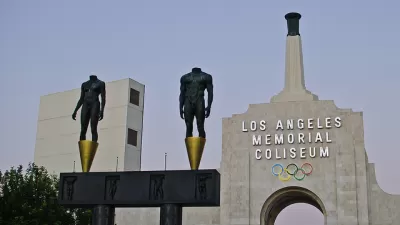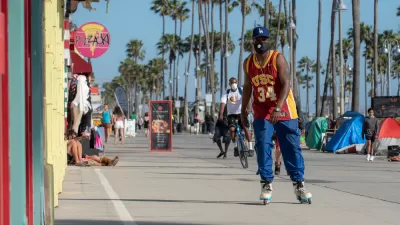The city could give 2,000 families $1,000 a month in what would be the largest program of its kind in the country.

If approved, a $24 million guaranteed income program in Los Angeles would be "the largest experiment of its kind in the United States" to date, writes Libby Denkmann in LAist. "Under the proposal, dubbed 'BIG: LEAP' (Basic Income Guaranteed: L.A. Economic Assistance Pilot), 2,000 Angeleno families at or below the federal poverty line would receive $1,000 a month for one year, no strings attached."
Los Angeles mayor Eric Garcetti told LAist "For families who can't think past the next bill, the next shift or the next health problem that they have, we can give them the space to not only dream of a better life, but to actualize it." The plan will likely include additional selection criteria such as "supporting a child under the age of 18 and a demonstrated medical or financial hardship connected to COVID-19."
"If successful, the Los Angeles pilot would serve as a major proof-of-concept for direct cash assistance that is divorced from the work requirements attached to many safety net programs for poor Americans, such as the Earned Income Tax Credit."
The concept of guaranteed income is nothing new. According to Michael Tubbs, former mayor of Stockton and one of the first city officials to push for a guaranteed income program in their city, "Dr. King called for guaranteed income in 1967. But the pandemic really illustrated the ways the economy isn't working for many people," paving the way for more cities across the country to consider some type of cash assistance. "It's a really important time to revisit the assumptions that have been underlying our existing welfare programs," says Nika Soon-Shiong, program director for the city of Compton's guaranteed income program, which launched this January.
FULL STORY: $1,000 A Month, No Strings Attached: Garcetti Proposes A Guaranteed Basic Income Pilot In Los Angeles

Study: Maui’s Plan to Convert Vacation Rentals to Long-Term Housing Could Cause Nearly $1 Billion Economic Loss
The plan would reduce visitor accommodation by 25,% resulting in 1,900 jobs lost.

North Texas Transit Leaders Tout Benefits of TOD for Growing Region
At a summit focused on transit-oriented development, policymakers discussed how North Texas’ expanded light rail system can serve as a tool for economic growth.

Why Should We Subsidize Public Transportation?
Many public transit agencies face financial stress due to rising costs, declining fare revenue, and declining subsidies. Transit advocates must provide a strong business case for increasing public transit funding.

How to Make US Trains Faster
Changes to boarding platforms and a switch to electric trains could improve U.S. passenger rail service without the added cost of high-speed rail.

Columbia’s Revitalized ‘Loop’ Is a Hub for Local Entrepreneurs
A focus on small businesses is helping a commercial corridor in Columbia, Missouri thrive.

Invasive Insect Threatens Minnesota’s Ash Forests
The Emerald Ash Borer is a rapidly spreading invasive pest threatening Minnesota’s ash trees, and homeowners are encouraged to plant diverse replacement species, avoid moving ash firewood, and monitor for signs of infestation.
Urban Design for Planners 1: Software Tools
This six-course series explores essential urban design concepts using open source software and equips planners with the tools they need to participate fully in the urban design process.
Planning for Universal Design
Learn the tools for implementing Universal Design in planning regulations.
City of Santa Clarita
Ascent Environmental
Institute for Housing and Urban Development Studies (IHS)
City of Grandview
Harvard GSD Executive Education
Toledo-Lucas County Plan Commissions
Salt Lake City
NYU Wagner Graduate School of Public Service





























